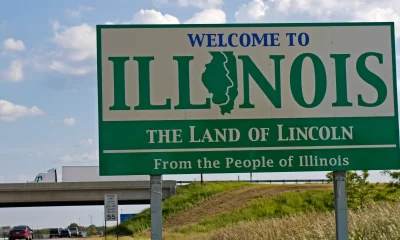Business
Virginia Subcommittee Approves Psilocybin Rescheduling Bill

One Virginia Senator introduced a bill to reschedule psilocybin and create an advisory board to monitor access.
Virginia Sen. Ghazala Hashmi’s bill, Senate Bill 932, recently passed in the Senate Education and Health Subcommittee on Jan. 25. Hashmi spoke to the subcommittee about what the bill offers, including how many psilocybin bills are being introduced across the country, and the importance of allowing psilocybin for patients.
“Mr. Chairman, this is SB-932 which addresses the issue of helping our community members who are in need of medication to address PTSD and depression issues but the other medications are not really assisting them and helping them to take care of their critical needs,” Hashmi said at the meeting. “Last year I had introduced a bill to decriminalize psilocybin, which has been proven to be quite effective in treating PTSD as well as depression issues, particularly among our military veterans. There’s increasingly compelling research coming out of Johns Hopkins [University], from Stanford, to demonstrate how effective the product is in the treatment of these particular concerns. There are many states that have already moved to decriminalize psilocybin and have seen good and effective results by doing so.”
The bill proposes the creation of the Virginia Psilocybin Advisory Board, which would take full responsibility in creating a “long-term strategic plan for establishing therapeutic access to psilocybin services and monitor and study federal laws, regulations, and policies regarding psilocybin.” It would also keep the advisory council accountable by setting an annual deadline of Dec. 1 each year to report to the governor and general assembly regarding “its activities and recommendations.” Finally, if passed it would reclassify psilocybin from a Schedule I to a Schedule III substance.
Additionally, the bill would direct the governor to appoint 12 members to the board, including a mycologist, a clinical researcher, and other public health and safety officials.
Currently, possession of a Schedule I substance, such as psilocybin, is a Class 5 felony that can lead to up to 10 years in prison and a $2,500 fine. Under SB-932, psilocybin would be a Class 1 misdemeanor, which can result in up to one year in prison and a $2,500 fine.
On Jan. 18, the Senate House of Justice subcommittee voted against passing House Bill 1513, a different bill that also aimed to establish a regulatory framework for psilocybin as a treatment for medical conditions such as depression or post-traumatic stress disorder. This was reintroduced by Virginia Del. Dawn Adams after a previous iteration failed in 2022.
Psilocybin legislation really took off in 2022, and that momentum is continuing into 2023.
California Sen. Scott Wiener introduced legislation to decriminalize psilocybin and other plant-based psychedelics with Senate Bill 58 in late December, which did not pass. In Connecticut, House Bill 5102 aims to allow psilocybin for therapeutic purposes. Rep. La Shawn Ford, introduced as House Bill 0001 on Jan. 12, would regulate psilocybin in Illinois. Missouri Rep. Tony Lovasco recently introduced House Bill 869 last week, an updated version of his bill from last year, which would allow psilocybin therapy. New Jersey Senate President Nicholas Scutari’s bill from 2022, Bill S2934, is being brought over into 2023 in an attempt to decriminalize psilocybin, as well as introduce expungement efforts. More bills are being introduced in Minnesota, Montana, and New York as well. Even legislators in Oregon, where two ballot measures were approved by voters to legalize psilocybin in 2020, are continuing to file new bills to fine tune and improve the state’s psilocybin law.
According to a study published by the American Medical Association in December 2022, most states will have legalized psychedelics between 2034 and 2037. “Legislative reform for psychedelic drugs has been proceeding in a rapid, patchwork fashion in the US,” the researchers stated in their conclusion. “Further consideration should be given to key health care issues such as establishing (1) standards for drugs procured outside the medical establishment, (2) licensure criteria for prescribers and therapists, (3) clinical and billing infrastructure, (4) potential contraindications, and (5) use in special populations like youths, older adults, and pregnant individuals.”
Source: https://hightimes.com/news/virginia-subcommittee-approves-psilocybin-rescheduling-bill/
Business
New Mexico cannabis operator fined, loses license for alleged BioTrack fraud

New Mexico regulators fined a cannabis operator nearly $300,000 and revoked its license after the company allegedly created fake reports in the state’s traceability software.
The New Mexico Cannabis Control Division (CCD) accused marijuana manufacturer and retailer Golden Roots of 11 violations, according to Albuquerque Business First.
Golden Roots operates the The Cannabis Revolution Dispensary.
The majority of the violations are related to the Albuquerque company’s improper use of BioTrack, which has been New Mexico’s track-and-trace vendor since 2015.
The CCD alleges Golden Roots reported marijuana production only two months after it had received its vertically integrated license, according to Albuquerque Business First.
Because cannabis takes longer than two months to be cultivated, the CCD was suspicious of the report.
After inspecting the company’s premises, the CCD alleged Golden Roots reported cultivation, transportation and sales in BioTrack but wasn’t able to provide officers who inspected the site evidence that the operator was cultivating cannabis.
In April, the CCD revoked Golden Roots’ license and issued a $10,000 fine, according to the news outlet.
The company requested a hearing, which the regulator scheduled for Sept. 1.
At the hearing, the CCD testified that the company’s dried-cannabis weights in BioTrack were suspicious because they didn’t seem to accurately reflect how much weight marijuana loses as it dries.
Company employees also poorly accounted for why they were making adjustments in the system of up to 24 pounds of cannabis, making comments such as “bad” or “mistake” in the software, Albuquerque Business First reported.
Golden Roots was fined $298,972.05 – the amount regulators allege the company made selling products that weren’t properly accounted for in BioTrack.
The CCD has been cracking down on cannabis operators accused of selling products procured from out-of-state or not grown legally:
- Regulators alleged in August that Albuquerque dispensary Sawmill Sweet Leaf sold out-of-state products and didn’t have a license for extraction.
- Paradise Exotics Distro lost its license in July after regulators alleged the company sold products made in California.
Golden Roots was the first alleged rulebreaker in New Mexico to be asked to pay a large fine.
Source: https://mjbizdaily.com/new-mexico-cannabis-operator-fined-loses-license-for-alleged-biotrack-fraud/
Business
Marijuana companies suing US attorney general in federal prohibition challenge

Four marijuana companies, including a multistate operator, have filed a lawsuit against U.S. Attorney General Merrick Garland in which they allege the federal MJ prohibition under the Controlled Substances Act is no longer constitutional.
According to the complaint, filed Thursday in U.S. District Court in Massachusetts, retailer Canna Provisions, Treevit delivery service CEO Gyasi Sellers, cultivator Wiseacre Farm and MSO Verano Holdings Corp. are all harmed by “the federal government’s unconstitutional ban on cultivating, manufacturing, distributing, or possessing intrastate marijuana.”
Verano is headquartered in Chicago but has operations in Massachusetts; the other three operators are based in Massachusetts.
The lawsuit seeks a ruling that the “Controlled Substances Act is unconstitutional as applied to the intrastate cultivation, manufacture, possession, and distribution of marijuana pursuant to state law.”
The companies want the case to go before the U.S. Supreme Court.
They hired prominent law firm Boies Schiller Flexner to represent them.
The New York-based firm’s principal is David Boies, whose former clients include Microsoft, former presidential candidate Al Gore and Elizabeth Holmes’ disgraced startup Theranos.
Similar challenges to the federal Controlled Substances Act (CSA) have failed.
One such challenge led to a landmark Supreme Court decision in 2005.
In Gonzalez vs. Raich, the highest court in the United States ruled in a 6-3 decision that the commerce clause of the U.S. Constitution gave Congress the power to outlaw marijuana federally, even though state laws allow the cultivation and sale of cannabis.
In the 18 years since that ruling, 23 states and the District of Columbia have legalized adult-use marijuana and the federal government has allowed a multibillion-dollar cannabis industry to thrive.
Since both Congress and the U.S. Department of Justice, currently headed by Garland, have declined to intervene in state-licensed marijuana markets, the key facts that led to the Supreme Court’s 2005 ruling “no longer apply,” Boies said in a statement Thursday.
“The Supreme Court has since made clear that the federal government lacks the authority to regulate purely intrastate commerce,” Boies said.
“Moreover, the facts on which those precedents are based are no longer true.”
Verano President Darren Weiss said in a statement the company is “prepared to bring this case all the way to the Supreme Court in order to align federal law with how Congress has acted for years.”
While the Biden administration’s push to reschedule marijuana would help solve marijuana operators’ federal tax woes, neither rescheduling nor modest Congressional reforms such as the SAFER Banking Act “solve the fundamental issue,” Weiss added.
“The application of the CSA to lawful state-run cannabis business is an unconstitutional overreach on state sovereignty that has led to decades of harm, failed businesses, lost jobs, and unsafe working conditions.”
Business
Alabama to make another attempt Dec. 1 to award medical cannabis licenses

Alabama regulators are targeting Dec. 1 to award the first batch of medical cannabis business licenses after the agency’s first two attempts were scrapped because of scoring errors and litigation.
The first licenses will be awarded to individual cultivators, delivery providers, processors, dispensaries and state testing labs, according to the Alabama Medical Cannabis Commission (AMCC).
Then, on Dec. 12, the AMCC will award licenses for vertically integrated operations, a designation set primarily for multistate operators.
Licenses are expected to be handed out 28 days after they have been awarded, so MMJ production could begin in early January, according to the Alabama Daily News.
That means MMJ products could be available for patients around early March, an AMCC spokesperson told the media outlet.
Regulators initially awarded 21 business licenses in June, only to void them after applicants alleged inconsistencies with how the applications were scored.
Then, in August, the state awarded 24 different licenses – 19 went to June recipients – only to reverse themselves again and scratch those licenses after spurned applicants filed lawsuits.
A state judge dismissed a lawsuit filed by Chicago-based MSO Verano Holdings Corp., but another lawsuit is pending.
Source: https://mjbizdaily.com/alabama-plans-to-award-medical-cannabis-licenses-dec-1/
-

 Business2 years ago
Business2 years agoPot Odor Does Not Justify Probable Cause for Vehicle Searches, Minnesota Court Affirms
-

 Business2 years ago
Business2 years agoNew Mexico cannabis operator fined, loses license for alleged BioTrack fraud
-

 Business2 years ago
Business2 years agoAlabama to make another attempt Dec. 1 to award medical cannabis licenses
-

 Business2 years ago
Business2 years agoWashington State Pays Out $9.4 Million in Refunds Relating to Drug Convictions
-

 Business2 years ago
Business2 years agoMarijuana companies suing US attorney general in federal prohibition challenge
-

 Business2 years ago
Business2 years agoLegal Marijuana Handed A Nothing Burger From NY State
-

 Business2 years ago
Business2 years agoCan Cannabis Help Seasonal Depression
-

 Blogs2 years ago
Blogs2 years agoCannabis Art Is Flourishing On Etsy











